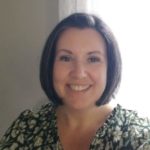Senior Managing Editor, Endocrine Practice, AACE Clinical Case Reports
American Association of Clinical Endocrinology

Please tell us a bit about yourself (e.g. hometown, current locale, course of study).
I’m originally from New Jersey but spent most of my life in Jacksonville, Florida. I attended University of Florida, where I received a bachelor’s degree in English Literature. I recently moved to Spartanburg, South Carolina, to be closer to family, enjoy the countryside and live close to the mountains.
Describe some of your current responsibilities, and what type of organization you belong to.
I work for the American Association of Clinical Endocrinology (AACE), a global medical association of endocrine-focused clinical members in the endocrine community. I serve as Senior Managing Editor for AACE’s medical journals, Endocrine Practice and AACE Clinical Case Reports.
Primarily, I act as the liaison between the journals’ editorial boards, publisher, and the association and oversee the AACE scientific journals’ editorial operations. I work closely with the Editors and our publisher to develop and implement editorial strategy and content improvement, and work on strengthening the journal’s brand, quality, and visibility. This includes working closely with the Editor-in-Chief and Editorial Board on content planning and development, keeping up to date with association events and activities for potential collaboration with the journal, and working closely with the publisher to monitor journal performance and increase journal visibility with marketing efforts.
What was your first scholarly publishing role? How did you get that job? What path led to your current position?
After college, I worked for a medical specialty association management company, where I worked on association newsletters, print materials and other communications. A few years later, I was hired as the Publications Director for the American Association of Clinical Endocrinology, where I managed all member publications, which, along with newsletters and weekly e-news, also included their medical journal, Endocrine Practice. The world of scholarly publishing was brand new to me, and I enjoyed the challenge of learning about publishing scientific journals – from the peer review process and programs to managing advertising and reprint sales and subscriptions, licensing and copyright permissions.
In 2015 we launched an open-access case reports journal to complement our premier journal. The continued increase in manuscript submissions, addition of the open-access journal and rapidly changing publishing landscape made it more challenging to continue publishing in-house, so in 2020 we partnered with Elsevier to serve as our publisher, and I transitioned into my new role as Senior Managing Editor for the journals.
If there was a pivotal moment or key person in your career development, please describe briefly.
When our organization made the decision to partner with Elsevier to serve as our publisher, I transitioned naturally into my new role as Senior Managing Editor. While we always had ample administrative support for our editorial office to serve the Editors and board, I knew we needed to devote more time and attention to developing our editorial strategy, but I was absorbed in journal operations. Publishing the journals via Elsevier has given me time I always wanted to work closely with the Editors-in-Chief and publisher on content development and journal performance.
Looking back, I can also say that having a liaison to serve between the association and publisher is critical to a successful publisher partnership. It serves the needs of the association and the editorial boards. Making the pivotal change of partnering with a publisher was key to my current role as Senior Managing Editor.
What tools, websites, and organizations do you find most valuable for your career development?
The Association of Learned and Professional Society Publishers (ALPSP) was a very helpful resource when I started learning about the many aspects of scholarly publishing years ago. As I became more familiar with the field, I found the Society for Scholarly Publishing (SSP) to be my number one resource, particularly when trying to learn more about the latest trends in publishing and what may lie ahead. The SSP webinars have been invaluable as I’ve transitioned from journal operations to an editorial role.
I’ve also found International Society of Managing and Technical Editors (ISMTE) to be a great resource and particularly helpful for editorial office management, from peer review to editorial board management.
What are some of the surprises/obstacles that you’ve encountered during your career?
Up until this point, I’ve focused on the tactics of journal publishing. In my new role, I’ve been able to take a step back, see the bigger picture, and understand what a critical role scholarly publishing plays in supporting and disseminating science and research in a world where we’re inundated with information. Making this connection has been surprising but meaningful and another reason why I’ve continued down this career path.
What do you wish you knew more about?
The future of this industry! The publishing landscape has changed so fast, and it can be difficult to predict what trends will endure and how we in the industry can take advantage of and work with new tools and technology.
And of course, more specific to my role, I’d like to learn more about editorial strategy and performance, data analysis, readership and citation trends, and ways to improve content and visibility.
What advice would you give to people interested in a career in scholarly communications?
I was lucky enough to “stumble” into this field while I was still trying to figure out where I fit in “the real world” – I admit I didn’t have a clear career path planned when I graduated. But I’d advise those interested in scholarly publishing to reach out and talk to someone who may be involved in the field – of course, SSP members would be a great resource!
More generally speaking, looking back on my uncertainty with the job-seeking process after college, I’d recommend college students to get an internship while they’re still in school to help them think realistically about life after college, and get some real-world experience prior to graduation.

